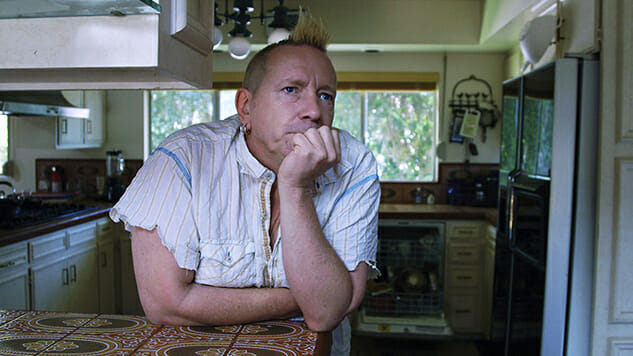The Public Image is Rotten
(2017 Tribeca Film Festival Review)
Photo: Tribeca Film Festival Movies Reviews The Public Image Is Rotten
At one point during the John Lydon/Johnny Rotten documentary The Public Image is Rotten, Lydon is in an interview with a music journalist. He’s asked about making an innovative sound for his latest Public Image Ltd album, and he replies that his words are original, his ideas are original, so why wouldn’t he have original music backing it up? Director Tabbert Fiiller had me coming back to that question as the movie continued: Your star is original, his story is original, so why wouldn’t you make an original music documentary for him?
The story of Johnny Rotten’s rise as the lead singer of the Sex Pistols, then his stumble and resurgence as the lead singer of PiL, was never the punk story its star seemingly deserves. Instead, his story is about the transformation of a notoriously riotous kid into an adult craving stability: A man once calling for “Anarchy in the U.K.” now seems ready to settle for monarchy. He’s simply a nice guy who went looking for a family in a profession and genre that fought him at every step. As such, The Public Image is Rotten’s talking heads and archival footage are juxtaposed with the kind of bleak, age-emphasizing reality of a VH1 Behind the Music hour—and generate the same level of excitement.
It’s all been seen and done before. Lydon’s bandmates acquire fame, get burned out or bold ideas, and abandon him, while the Sex Pistols manager, Malcolm McLaren, retains contractual rights to the Pistols’ output, and even to the name “Johnny Rotten.” Meanwhile, after these setbacks and Lydon’s second chance in post-punk, PiL’s lineup churned constantly over the course of its existence, meaning Lydon’s need for trust and truth was always disappointed.
This need, we find, stems from a childhood bout with meningitis that left Lydon comatose for months. When he awoke, he had no memories. Couldn’t speak, walk, use a spoon. Didn’t know his mother, father or little brothers—he just had to live with these strangers claiming to be his family. It took him four years to regain his memories and the experience left him permanently jaded towards others trying to tell him who or what he was. Self-discovery, for Lydon, must necessarily come in an environment of complete faith.
It’s a recipe for madness that Lydon somehow funneled into creative success, into the roguish personality that got him there and—most surprisingly—into a well-adjusted nuclear family. His wife, who’s successfully avoided the spotlight for years, doesn’t appear in the documentary. She doesn’t like cameras and Lydon respects that desire over all else, talking warmly instead of raising her grandchildren with her.
It’s nice to know he’s happy, but no audience is ever riveted when the answer to “How are you?” is “Just fine.” Regularity can be a fascinating subject, especially when it comes from an iconic punk, but the film discovers its own message after the fact. We instead watch hours of simple chronological progression through the years, a career retrospective with plenty of behind-the-scenes footage but nothing enlightening to say we can’t understand simply watching the footage on our own.
The Public Image is Rotten’s soundtrack is, of course, great, and the candidness from former bandmates regarding their backstabbing and youthful mistakes is certainly refreshing, but it’s all wrapped in a package wearing dad jeans: too safe, too simple, too given to a happy ending. The documentary is certainly not helped by Fiiller’s tepid direction, as exciting as an infomercial and cut with as much personality as something with a medical, monotone voiceover listing potential side effects. In other words, the film’s static competence is more disappointing than if the film was wildly inept. The public image? It’s not rotten—it’s that of a milquetoast.
Director: Tabbert Fiiller
Starring: Martin Atkins, John Lydon, Jah Wobble
Release Date: Premiered at the 2017 Tribeca Film Festival
Jacob Oller is a writer and film critic whose writing has appeared in The Guardian, Playboy, Roger Ebert, Film School Rejects, Chicagoist, Vague Visages and other publications. He lives in Chicago, plays Dungeons and Dragons, and struggles not to kill his two cats daily. You can follow him on Twitter..